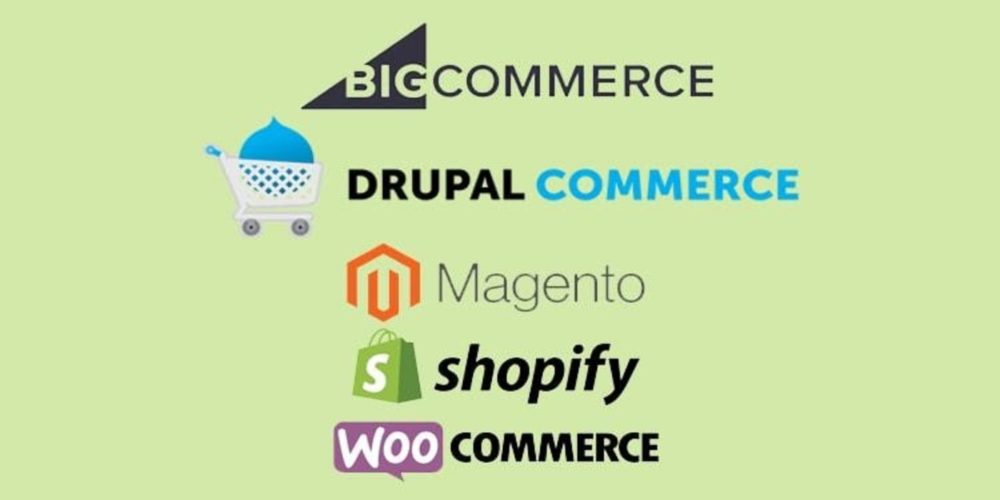All around the globe, people order a wide range of products and services online. This is why launching an online business proved to be a profitable investment. The ease of buying and selling through e-commerce has become an integral part of our daily lives, and it is hard to imagine life without it. So what does it take to create a successful e-commerce business?
What Is Ecommerce?
E-commerce, (electronic commerce) is a business model that refers to buying and selling products or services over the Internet. Ecommerce allows you to do business online without having to visit a physical store. In its effectiveness, e-commerce has succeeded in slowly cutting down the need for massive investments or outlays on physical infrastructure. In addition to online shopping, other e-commerce activities include internet banking, payment gateways, online auctions, and ticketing.
E-commerce has significantly evolved throughout the years. Examples and benefits of e-commerce are seen in easy and automatic order processing, faster shipping time, improved payment options, advanced, user-friendly interface, and more. These significant changes have made an impact in understanding the usefulness of a successful e-commerce business
If you are looking to learn how to start a successful e-commerce business, then this article will help guide you through
What Is Ecommerce?
E-commerce, (electronic commerce) is a business model that refers to buying and selling products or services over the Internet. Ecommerce allows you to do business online without having to visit a physical store. In its effectiveness, e-commerce has succeeded in slowly cutting down the need for massive investments or outlays on physical infrastructure. In addition to online shopping, other e-commerce activities include internet banking, payment gateways, online auctions, and ticketing.
E-commerce has significantly evolved throughout the years. Examples and benefits of e-commerce are seen in easy and automatic order processing, faster shipping time, improved payment options, advanced, user-friendly interface, and more. These significant changes have made an impact in understanding the usefulness of a successful e-commerce business
If you are looking to learn how to start a successful e-commerce business, then this article will help guide you through
1. Choosing Your Product
This step may be one of the hardest steps, but it is certainly not impossible to achieve. With the right tactics and effort, you can navigate through this first and vital step. When considering what product or service to sell online, you need to ask fundamental questions such as "What product or service are people willing to buy into?" , “what is the purpose of your business?”, and “how adaptable is my business to the times?”
The fundamental thing here is to focus on your potential customers' needs and the product they will be willing to pay for and not what you feel you can sell to make money. You can also consider the things that friends, co-workers, or family would be interested in. Also, explore popular social selling sites such as Pinterest, Etsy, Instagram, etc. for more input on what to sell.
To help you have a clearer idea of the right products to sell, you can make use of tools that specialize in product research. These tools provide the kind of data that will help you discover products that are in high demand. The data consists of monthly sales estimates, sales rank, reviews on a competitor, and likewise an opportunity score to help weigh demand against the competition.
While going through the process of picking a product, always remember that sales are specifically for e-commerce and not a walk-in store. With this in mind, your products need to fit the following bill:
The fundamental thing here is to focus on your potential customers' needs and the product they will be willing to pay for and not what you feel you can sell to make money. You can also consider the things that friends, co-workers, or family would be interested in. Also, explore popular social selling sites such as Pinterest, Etsy, Instagram, etc. for more input on what to sell.
To help you have a clearer idea of the right products to sell, you can make use of tools that specialize in product research. These tools provide the kind of data that will help you discover products that are in high demand. The data consists of monthly sales estimates, sales rank, reviews on a competitor, and likewise an opportunity score to help weigh demand against the competition.
While going through the process of picking a product, always remember that sales are specifically for e-commerce and not a walk-in store. With this in mind, your products need to fit the following bill:
- ● Trends: the product needs to be what is in vogue. Rather than selling old stuff, anyone can get off a shelf, capitalize on providing the best of trending products. Google trend is a perfect tool to help you check out top trends.
● Light: you need to bear in mind that a lot of shipping will take place when you sell products online. So take the weight of the products you choose to sell into consideration to avoid the high cost you will need to pay for shipping heavier products.
● Cost-efficient with high value: try to consider products that have low production costs but a value that comes across as higher.

2. Validate Your Ideas and Research
After you have a big picture of a potential successful e-commerce business, the next step is to narrow down the list. For the most part of validating your list, the first thing to do is to take out the products that have no unviable schemes. Validation allows you to have a clear picture of what business stands out and where your strengths and weaknesses lie considering the businesses on your list. Amazon is a great free tool you can use to filter down your ideas for starting an e-commerce business.
At this point, additional research becomes essential. Research allows you to identify better products to sell and gives you an in-depth understanding of how to start a successful small online store. It also helps you consider costs and the likelihood of any potential legal implications that may come with selling a particular product. From the list of e-commerce businesses on your list, you can go further to research business models on each business. The goal here is to find a type of commercial model that will best suit your business. The four available business models include:
At this point, additional research becomes essential. Research allows you to identify better products to sell and gives you an in-depth understanding of how to start a successful small online store. It also helps you consider costs and the likelihood of any potential legal implications that may come with selling a particular product. From the list of e-commerce businesses on your list, you can go further to research business models on each business. The goal here is to find a type of commercial model that will best suit your business. The four available business models include:
- ● Business to Business (B2B): The target audience here are companies, so online sales of products are between companies instead of individuals.
● Business to Consumer (B2C): The target audience here are individuals, and sales are made from your business to individual consumers. For example, Amazon and PayPal.
● Consumer to Business (C2B): This model is the reverse of the B2C model. In this case, the consumer sells products or services to a business or an organization. For example, a programmer, content creator, or any other service provider working online.
● Consumer to Consumer (C2C): Here, a consumer sells their product or service to other individual consumers; usually, sales on this model are carried out through the third-party website.
3. Building Your Ecommerce Store
If you're a young e-commerce entrepreneur, you might think that building your store should be first. I wish it was that easy. Once you have chosen your products carried out thorough competitor research - select the appropriate business model. Afterward, the next step is to develop a successful e-commerce business. But before setting up your store, the following should be taken care of:
- ● Register Your Business with the appropriate agency.
● Pick Your Store's Name: This can be separate but identical to the name used to register the business.
● Get Your Business Licenses: lookout for business associations and mentors who can give you the event for little things like acquiring business licenses to operate your online store.
● Get Your Employer Identification Number: this is like a social security number for your business. It also enables you to file your business taxes and essential paperwork even though you don't plan on having any employees.
● Find The Right Vendors: bearing in mind there is competition in every business. It is in the best interest of your business to find the best quality and best prices for the material you use in creating your products.
● Logo creation and Visual: make use of appealing colors and fonts for your brand. If you've got the budget, you can employ the services of a graphic designer. A designer is best suited to create a design brief for your company.
Subsequently, the next step is to set up your store on an e-commerce platform. You can select from e-commerce platforms like BigCommerce, Shopify, Drupal Commerce, Magento, etc. all of which offer headless commerce capabilities . This makes setting up the e-commerce store much more straightforward. Similarly, these platforms come with multiple templates you can easily make use of. Furthermore, choose a platform that suits your budget, Then proceed to select a theme that reflects your brand and appeals to your target audience.

When selecting an e-commerce platform, you need to consider details. Examples of these are page loading speed and your web developer skills. Also, you will need to have Search Engine Optimization (SEO) friendly features compatible with different payment gateways, and most importantly, your business structure.
Subsequently, when your online store is ready to start taking orders, do a test run. Check everything to ensure that the process is smooth and prepared for customers and businesses. You want to make sure that you set up an effective e-commerce organizational structure from the beginning. Further to that, concentrate fully on e-commerce marketing. There are thousands of other similar e-commerce businesses. So, you need to stand out to be able to generate traffic and reach potential customers. These are the things you will need to focus on if you want to launch a successful e-commerce business.
Setting up your e-commerce store goes beyond just adding your products and content. Hence, you will need to employ the use of other marketing strategies, such as social media marketing, email marketing, and promotional activities. You will also have to improve your store's SEO rankings, so your potential customers see you on the first page of their web search results.
Subsequently, when your online store is ready to start taking orders, do a test run. Check everything to ensure that the process is smooth and prepared for customers and businesses. You want to make sure that you set up an effective e-commerce organizational structure from the beginning. Further to that, concentrate fully on e-commerce marketing. There are thousands of other similar e-commerce businesses. So, you need to stand out to be able to generate traffic and reach potential customers. These are the things you will need to focus on if you want to launch a successful e-commerce business.
Setting up your e-commerce store goes beyond just adding your products and content. Hence, you will need to employ the use of other marketing strategies, such as social media marketing, email marketing, and promotional activities. You will also have to improve your store's SEO rankings, so your potential customers see you on the first page of their web search results.
4. Set up Your Ecommerce Customer Service
For every successful e-commerce business, having active customer service is vital. Although most people are quite comfortable when it comes to buying products online, there are still traces of doubt about scams. Therefore, helpful and prompt assistance to customers will help quell such worries.
Customer service is also a great way to interact with your customers and get product reviews. That's not it. Having outstanding customer service will help your eCommerce store get more repeat customers. When starting running your store, chances are, problems will come up. You have to be proactive when dealing with issues, ensure that communication with your customers is always clear. In addition to that, lousy customer service could give you a bad reputation immediately. A few tips to consider when setting up a stellar e-commerce customer service include:
Customer service is also a great way to interact with your customers and get product reviews. That's not it. Having outstanding customer service will help your eCommerce store get more repeat customers. When starting running your store, chances are, problems will come up. You have to be proactive when dealing with issues, ensure that communication with your customers is always clear. In addition to that, lousy customer service could give you a bad reputation immediately. A few tips to consider when setting up a stellar e-commerce customer service include:
- ● Setting up a Unique Customer Support Email
● Replying to Emails Quickly
● Writing Email Templates
● 24 hours customer support
● Sending Handwritten Thank You Notes
● Give Free Product to Unhappy Customers
● Save Repetitive Questions and Create FAQs
● Setting Up a Help Desk
Ready to Launch a Successful E-commerce Business ?
Launching a successful e-commerce business with lots of big ideas isn't a bad idea. However, it is best you put aside your ambitions and focus first on the most practical steps of planning and kick-starting a successful e-commerce business. As a matter of fact, you don't have to be a Jeff Bezos before you can make good money selling products online!Growth Hackers is a renowned eCommerce branding agency helping businesses create better brand awareness through proven and tested digital marketing and growth hacking strategies. If you're keen to start your e-commerce business journey, drop Growth Hackers a line when you have a moment!





1 Comment
You need to know how to install it first. You need to choose your ecommerce platform and go from there.